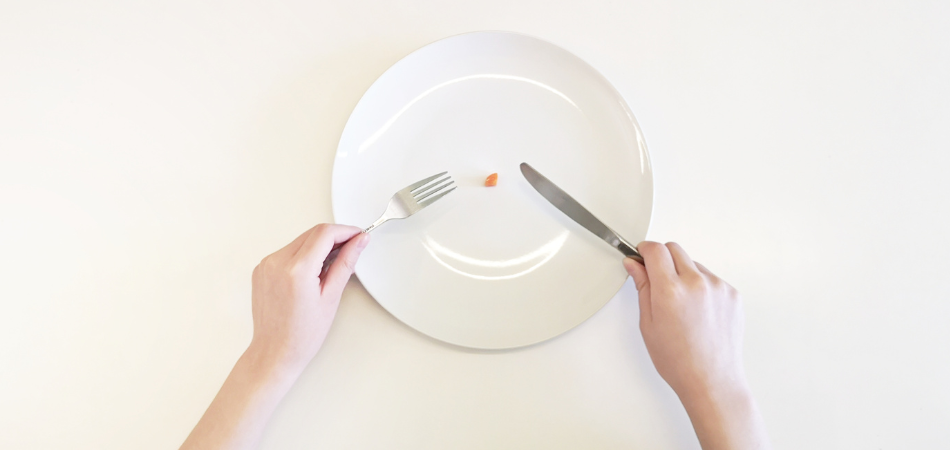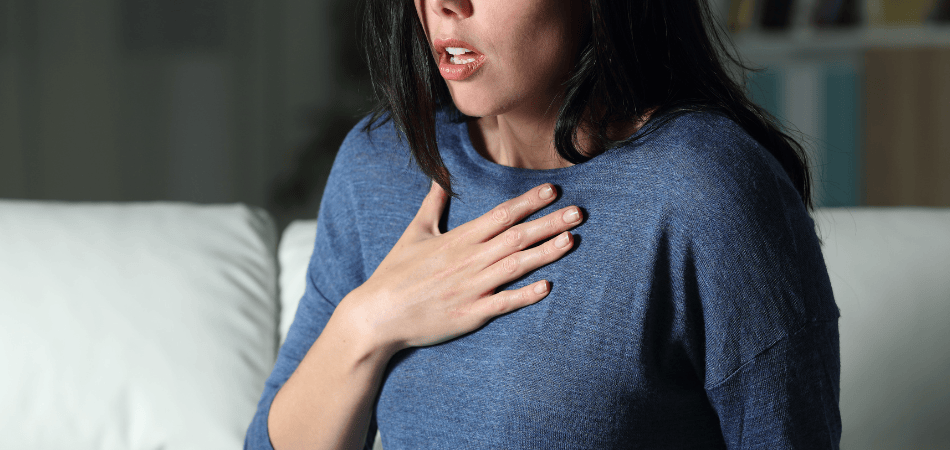Eating disorders
While for many people, food is one of the great pleasures in life, there are many different types of eating disorders that can have terrible consequences for the individual and their family. Between April and October of 2022 alone, 10,000 children began treatment for eating disorders which is a two-thirds increase compared to pre-Covid numbers. The best way to effectively beat eating disorders involves professional eating disorder rehab; with the right treatment and support, you can develop a new relationship with food which can transform your life.

What is an eating disorder?
Eating disorders refer to a range of different mental health conditions that can cause people to change the way they think, feel and behave around food. Eating disorders can be incredibly difficult to live with because food is essential for survival and yet it can be seen as a real enemy by those suffering from the condition.
An eating disorder is often defined as a behavioural addiction which is a compulsive need to engage in a certain behaviour (such as not eating, overeating or throwing up after eating) despite negative consequences. However, unlike other types of addiction, you cannot just stop eating food altogether like you can with drugs or alcohol which makes eating disorders treatment and recovery extra complicated.
Different types of eating disorders
Although eating disorders can take many forms, there are three main types which are treated in rehab – anorexia nervosa, bulimia nervosa and binge eating disorder.
Anorexia Nervosa
People with Anorexia Nervosa have a fear of gaining weight and will strive to keep their weight as low as possible. They have an unrealistic view of their body image and often believe that they are overweight even if this is not the case. Even if they are aware that they are thin, they may still believe there is more weight to lose.
Those suffering from Anorexia Nervosa usually attempt to severely limit the food they consume and may completely restrict certain foods. They may also exercise excessively in a bid to lose weight. Anorexia Nervosa is a serious condition that can lead to a host of physical health conditions including organ failure, infertility, bone loss, brain damage and death.
Bulimia Nervosa
Bulimia Nervosa sufferers differ from Anorexia Nervosa sufferers as they don’t limit their food intake. However, they follow eating with purging or taking laxatives to get rid of the food, as they feel ashamed of consuming calories.
Like Anorexia sufferers, those who suffer from bulimia tend to be unhappy with their body image and fear putting weight on. They often suffer from low self-esteem and may carry out their purging in secret. Bulimia Nervosa can also result in a range of health issues such as severe dehydration, gastrointestinal problems and heart conditions.
Binge eating disorder
Also commonly referred to as compulsive eating disorder, people with binge eating disorder regularly lose control over the amount of food they consume. They continue to eat, despite not being hungry. Unlike those with Bulimia Nervosa, however, people with binge eating disorder do not purge themselves. This puts them at increased risk of becoming obese and developing obesity-related conditions such as heart disease and type II diabetes.
Individuals with binge eating disorder may also experience feelings of guilt, shame and self-loathing after bingeing which can be both symptoms and triggers for other underlying mental health conditions.
Can you have multiple eating disorders?
Eating disorders are complex and nuanced. It is possible to have more than one eating disorder at a time, and they can interact with each other and affect people in different combinations. For example:
Someone with Bulimia Nervosa might also have Anorexia Nervosa, which means that they would restrict their food intake and then purge the little they do eat.
In the case of co-occurring binge eating disorder and Bulimia Nervosa, a person may regularly eat large amounts of food and then purge.
Those with both Anorexia Nervosa and a binge eating disorder may alternate between periods of extreme food intake restriction and then eat large amounts of food in a short period of time.
Each of these combinations can lead to different physical and mental health consequences and make the conditions incredibly hard to live with and treat. If you or someone you know is struggling with an eating disorder, it’s important to seek professional help. Liberty House’s sister centre Banbury Lodge provides eating disorder rehab for many different conditions and has helped a huge number of people take back control of their lives.
Common signs of an eating disorder
Eating disorders can be so intense and debilitating that most people who suffer from one will be fully aware of their condition. Nevertheless, people with eating disorders rarely seek treatment themselves and it is typically down to loved ones to seek help and advice. Despite this, the individual with the eating disorder needs to be willing to undergo treatment for it to be successful. To help you spot if there is an issue so that you can enter rehab as soon as possible, here are the common signs of eating disorders:
Signs of anorexia:
- An obsession with being thin and never being thin enough
- A fear of gaining weight
- A distorted body image
- Severely restricted eating
- Excessive exercising
- Brittle nails and hair
- Fine hair on the body
- Feeling cold all the time
- Extreme lethargy
Signs of bulimia:
- Always going to the bathroom after meals
- Swollen glands in the jaw or neck area
- Constant sore or inflamed throat
- Dehydration
- Stomach problems from laxative use
- Gastrointestinal problems and acid reflux
- Sensitive teeth from recurrent vomiting
Signs of binge eating disorder:
- Eating large amounts of food in a short timeframe
- Being secretive about the amount of food being eaten
- Claiming to be hungry having just eaten
- Eating to the point of discomfort
- Feeling guilty, ashamed or disgusted after eating
- Anxiety and depression
- Trouble sleeping due to high amounts of sugar
- Predominantly eating high-fat or sugary foods
If you notice these eating disorder symptoms in a loved one, it is crucial that you get them professional help as soon as possible. This is not always easy as many sufferers can be initially resistant to receiving eating disorder treatment. Get in touch with Liberty House today and we can help explain how our eating disorder recovery programme can help.
What are the main causes of eating disorders?
Many believe that eating disorders such as anorexia and bulimia are caused solely by social pressure to look a certain way. While this can certainly be a factor in the development of eating disorders, the causes are often much more complicated than that. There are a number of things that can trigger an eating disorder, and some people are more susceptible than others. Those with an increased risk of developing eating disorders may have the following:
- A family history of eating disorders, substance abuse or depression
- Experience of being bullied or criticised for their weight, body shape or eating habits
- A desire to be thin because of a particular activity such as modelling, athletics or dancing
- An obsessive personality, low self-esteem or an anxiety disorder
- Troubled relationships with friends or family members
- Trauma due to an unpleasant event such as the death of a loved one, or a result of suffering emotional or physical abuse
- Difficulty dealing with stressful situations at home, at school or at work
Treating eating disorders
An eating disorder does not emerge because a person hates food – there is something that has happened to them or is going on inside them that is causing it. For successful eating disorder recovery, it is important that these underlying causes are identified, understood and addressed systematically. This will give you the skills and knowledge to manage your condition in the long term.
Rehab treatment in a residential centre like our sister centre, Banbury Lodge, is the most effective solution for eating disorders. This ensures that you are in a safe and supportive environment where you can focus on your recovery without distractions and that you have access to the best possible care and resources 24/7.
We offer a range of eating disorder treatment programmes, including:
- Anorexia Nervosa treatment
- Bulimia Nervosa treatment
- Binge eating
Our expert team has many years of experience in treating all types of eating disorders and will work with you every step of the way. Some of our therapies and treatments include:
- Individual therapy and group therapy
- Cognitive behavioural therapy (CBT)
- Dialectical behaviour therapy (DBT)
- Family therapy and support
- Yoga
- Gong bath
- Sound therapy
- Art therapy
- Trauma therapy
Our private chef, in consultation with our eating disorder specialists, will also prepare specialised meals that meet your individual nutritional needs. This will ensure that you are getting the right nourishment to help your body and mind recover.
What’s next?
If you are worried that you have an eating disorder, you can contact both your GP or get in touch with Banbury Lodge. Our admissions team are on hand to answer any of your questions and offer support and guidance. Eating disorders can seem inescapable but if you are ready to make a change, we are here to help.
Frequently asked questions
- Attending aftercare programme therapy sessions or eating disorder support groups
- Following your meal plan and eating regular, nutritious meals
- Understanding your triggers and ensuring that you have a plan in place to deal with them
- Building a support network of friends and family who you can rely on
- Having an effective plan in place to help cope with stress and setbacks
- Taking it one day at a time and trusting in the eating disorder recovery process








